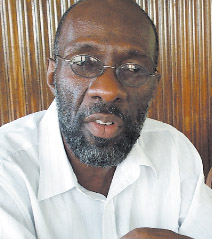Former PNCR MP Vincent Alexander says the appointment of persons to various posts in the Audit Office through a vote in the Public Accounts Committee (PAC) is a done deal because of the absence of one of the opposition members and Chairman Carl Greenidge not having a vote in the circumstances.
On Monday, Greenidge proposed to have the National Assembly examine whether or not he was entitled to a vote. He had not voted at the PAC meeting on June 25, when the appointments, including that of the wife of the Finance Minister, were forced through, after PPP/C members on the committee took advantage of the absence of AFC member Trevor Williams. Greenidge was said to have accepted the advice of the Clerk of the National Assembly, which was that according to the Standing Orders, he did not have a vote.

In a letter which appeared in another section of the media recently, Alexander said, “There are those who questioned his actions and knowledge, as chairperson.
What is the crux of the matter? Was Mr Greenidge entitled to two votes? One as an ordinary member of the committee and another, as chairperson, to be used in the instance of an equality of votes (tie)? The answer to the question is to be found in the Standing Orders of the Assembly.”
He pointed out that Standing Order 70(2) lists the PAC as a sessional select committee. “Standing Order 74(3) Division in Select Committees states [that the Chairman shall not have an original vote but in the event of an equality of votes he shall give a casting vote],” he said.
He added that when this Standing Order is applied to the sitting of the PAC on the occasion of the approval of the staff of the Auditor-General’s Office, “the facts are as follows: The PAC comprises nine members: four from the government and five from the opposition. On the day in question eight members were in attendance… four from each side. Mr Greenidge was presiding as chairperson and was entitled to vote only if there was an equality of votes (tie), after the other members would have voted,” he explained.
“The four government members voted for the appointments. The three opposition members voted against. There was no equality of votes hence the chairperson could not vote,” he said. “The appointments were therefore a done deal. The absence of one opposition member made it a done deal,” he said.
He said anyone who explains the events differently “is either unaware of the facts and/or the application of the Standing Orders or is malicious” and that any such person needs to be educated or sanctioned for wrongdoing.
Greenidge earlier this week told this newspaper that the revision of the Standing Orders was not done in a comprehensively enough manner, resulting in inconsistencies with regard to the power of the PAC Chairman to vote. He noted that some Standing Orders said he had a vote while some said he did not have a vote. The appointment of Gitanjali Singh, wife of Finance Minister Dr Ashni Singh, to Audit Director, has generated concern over her facing a potential conflict of interest in the performance of her duties at the Audit Office, which is responsible for auditing the government accounts prepared by the minister.




